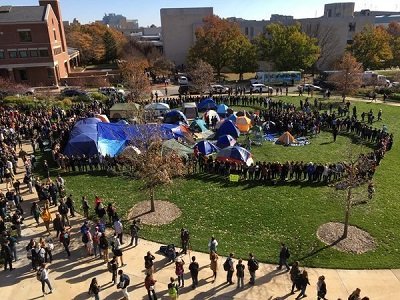(CNN) — The recent resignation of University of Missouri System President Tim Wolfe is not about one incident of a student being threatened with the use of the “N-word,” but a part of a long history of intolerance that has only been intensified by the emergence of the #Ferguson and #BlackLivesMatter movements.
As a proud alum of Mizzou’s School of Journalism, I am disheartened when students tell me that they are facing the same issues familiar from my days on campus and from decades past. Because of the power of social media, we all had a firsthand look from “ground zero” in Columbia.
Although much of the racial tension that people experience in Columbia today existed when I attended the university between 1999 and 2003, this moment feels like a new day.
Two weeks ago I had the opportunity to visit the campus, and could immediately feel a heightened sense of anxiety in the students as well as faculty and staff. I could see the uneasiness in their eyes. The students are hurt, scared, angry and fearful. Thankfully, despite the emotional and spiritual trauma they have experienced they are incredibly optimistic, resilient, decisive and clear about one thing: The University of Missouri System must commit to every possible avenue to make the campus safe and inclusive for every student, staff and faculty member.
I was recently asked by a colleague what started all of this, and with a quick scan of the recent news stories, both national and local to Columbia, Missouri, there has not been an exhaustive look into how we got here.
It would be shortsighted not to start with Gaines vs. Canada, one of the most important civil rights cases in the 1930s. Cy Woodson Canada, the Registrar at the University of Missouri’s Law School, refused admission to Lloyd Gaines because he was black.
I could also point to the fact that 1950 was the first year when black students, nine in total, were admitted to the University. Or the fact that the first black student organization, my fraternity, Kappa Alpha Psi, was founded in 1960, and could reflect upon the experiences that we have heard through oral tradition of the tension between the early members of the chapter on campus and predominantly white fraternities.
We could also talk about the more recent examples, such as the 2010 incident of students placing cotton balls over the lawn of the Gaines-Oldham Black Culture Center, which was named after Mr. Lloyd Gaines. We could tell stories from each decade, but there’s no need. It’s clear that racial intolerance has a deep, dark history at my alma mater.
The student activist group Concerned Student 1950 has been able to do what no other groups have been able to accomplish on campus — galvanize the required awareness that our alumni, administration and faculty need to elevate these Iong-standing issues to a higher priority level than ever before. I supported their efforts to make sweeping changes to the university, along with the list of demands that were submitted to and essentially ignored by former President Wolfe.
The students were incredibly thoughtful for sharing their perspective and solutions to heal our campus, and their requests deserved to be taken a lot more seriously than they were. One of those requests was for the resignation of the system president. Members of Concerned Student 1950 felt that he failed to fulfill a major part of his job — to ensure that the four universities inside of the system were safe and inclusive places of learning for all students.
Now that Tim Wolfe has resigned, as well as Mizzou Chancellor Bowen Loftin, amid a variety of issues beyond the poor handling of race and cultural relations, the long and hard work begins. The collective duty of building a campus environment that keeps our campus and community safe will need to increase, now, more than ever.
While four incidents this past semester precipitated the call for Wolfe’s resignation, the issue now is reversing the damage from a half-century of the university being unprepared to deal with the incidents that will happen when you merge populations of students, faculty and staff that all have different views about one another, both positive and negative.
One essential solution that has been a missing component to healing on campus is the role of the alumni. Over the past week, alumni have stepped up and shared their voice and support to the transformation that needs to take place for the sake of the university and most importantly, the students.
Within a few hours nearly 1,000 Black Alumni signed a petition in support of the Concerned Student 1950 movement. That kind of support behind the students needs to continue and to increase. This protest was the work of hundreds of concerned students that used their talents and platforms to bring awareness to what they and others felt. Although many news outlets are reporting that Wolfe’s resignation is almost solely linked to the football players’ strike, that was only part of the saga.
We must not lose sight of the history of so many former students, campus staff, and faculty who have wanted to see justice, inclusion and safety for nearly an entire century. We must also not lose sight of the future, which will take a lot of intentional work from all constituents of the MU community of students, faculty, administration, parents, staff, and legislators (local, state and national).
Now that the world is watching, what will we show them: our best or our worst?
The-CNN-Wire
™ & © 2015 Cable News Network, Inc., a Time Warner Company. All rights reserved.
